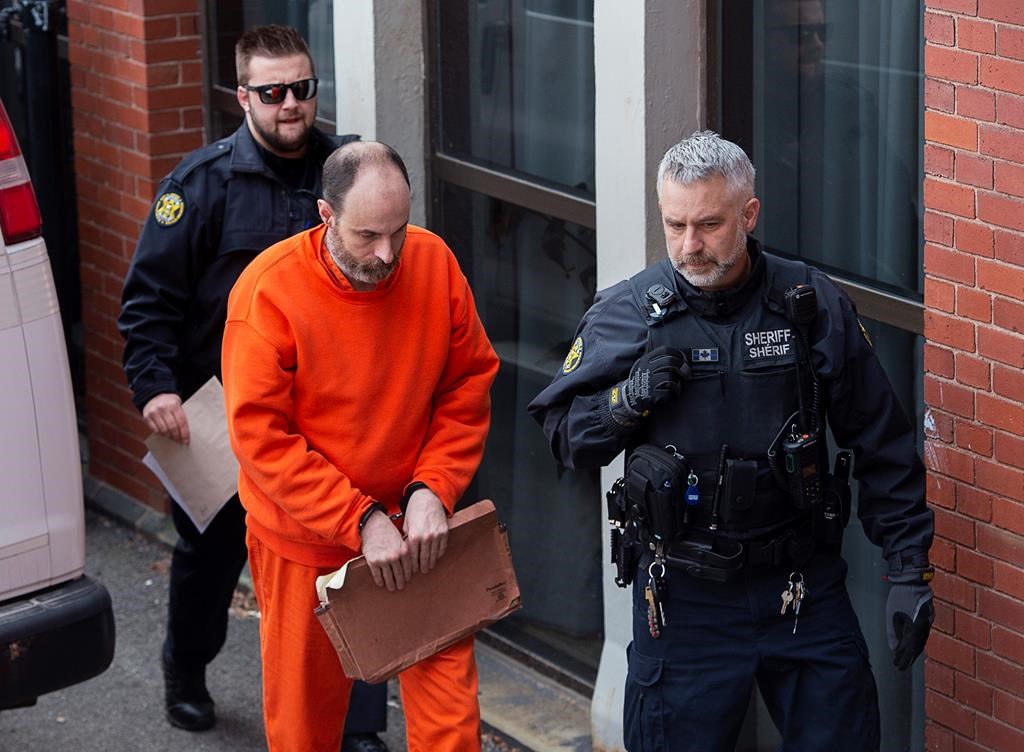Matthew Raymond, who shot and killed four people in August 2018 in Fredericton, has been granted accompanied privileges in Campbellton for treatment with a staff member from the Restigouche Hospital Centre (RHC) by the New Brunswick Parole Board.

Raymond was found not criminally responsible on account of mental disorder in November 2020 in the deaths of two Fredericton police officers, constables Robb Costello and Sara Burns, as well as Bobbi-Lee Wright and Donnie Robichaud.
This is Raymond’s third attempt to seek supervised visits in the community of Campbellton, with the third including meeting his mother within the town and outings like going to bowling alleys where the space would be rented out so the public couldn’t interact with the patients.
The Parole Board said Raymond must remain detained at the RHC, but the board doesn’t have a punitive mandate toward the accused.
“That is why he is detained: to be treated,” the decision reads. “And for the treatment team to go forward with treatment, they need to increase privileges at different levels to assess the results.”
The board still believes Raymond “poses a significant threat to the safety of the public,” but “that privileges may be granted for the purposes of treatment.”
In 2021 and 2022, Raymond was denied supervised outings, with the Parole Board saying he was “still a significant threat to the safety of the public.”
- Son of Norway’s crown princess arrested before his trial on rape, other charges
- RCMP misconduct cases grew in 2024, dismissals increased 5-fold: report
- Two teens arrested in connection with First Nation double homicide in northern Quebec
- Luigi Mangione will not face death penalty in federal trial, judge rules
In their decision, dated April 6, 2023, the parole board said it was not unreasonable the public could be safe if the accused is escorted by a staff member from the hospital for treatment purposes.
“The entire treatment team presented evidence to convey that their job to treat Mr. Raymond towards a reintegration in the community,” the decision reads. “For that, the teams needs to have activities with him so they can assess if he benefits from the education and the treatment that he is getting at the hospital.”

Get breaking National news
Raymond won’t be allowed to see his mother outside a hospital environment, with the board saying “nothing prevents the accused and his mother from face-to-face meetings at the hospital as long as they comply with the order.”
The decision, which includes testimony from his team, said one of Raymond’s biggest stress factors is that he worries about his mother.
The privileges are subject to the opinion of the person in charge of the RHC and a structured plan which has been prepared to address any risk related to Raymond’s absence, and the absence will not present undue risk to the public.
Raymond must also keep the peace and be of good behaviour, he must consent to and comply with his medication and treatment programs offered to him, refrain from possession of offensive weapons, firearms and ammunition, and refrain from access to a computer or smart devices unless given permission by hospital staff and is monitored.
‘Symptoms in full remission’
Dr. Ralph Holly told the board he did not see Raymond display any evidence of depression in the past year.
“His psychotic symptoms are in full remission and he has a good relationship with the treatment team along with a very good insight into his illness,” the decision reads.
It said nursing staff have indicated Raymond takes his medication and “never misses a dose.” The decision also said Raymond is complying with treatment programs including an emotional management program.
“Throughout the program, Mr. Raymond demonstrated varying levels of motivation, however, he attended all sessions and participated in practicing all of the coping strategies,” Laura Ann Paul wrote in a report to the board.
Nursing staff will perform mental status assessments on Raymond before he’s allowed to do activities.
Raymond underwent several tests before making his appeal to the board.
Dr. Emilie Frenette conducted many of them, writing the board: “During the assessment, Mr. Raymond was pleasant and cooperative. His mood and affect were, for the most part, engaging and appropriate to the evaluation context.”
Frenette described Raymond’s gross psychological process as within normal limits.
The Jesness Inventory-Revised test showed “being in control would be important for Raymond and manipulation could be used to achieve his goals or to satisfy his needs.”
A Psychopathic Personality Inventory-Revised test showed Raymond does not suffer from psychopathy, although it indicated there could be under-reporting of symptoms.
Frenette said in the days leading up to the shooting in August 2018, Raymond believed, due to his schizophrenia, that people wanted to hurt him and the “psychotic symptoms acted as a destabilizer for the client, which led him to commit four murders.”
“Currently, the client does not appear to have negative symptoms of schizophrenia or hallucinations,” Fernette wrote to the board. “However, he still presents some residual symptoms that could be partly explained by schizophrenia and partly by Group A personality traits.”
Frenette described Raymond as sometimes appearing distrustful and suspicious of others at times, adding he withholds information possibly because he is afraid it will be used against him.
“He tends to hold grudges easily and tends to choose solitary activities.”
Frenette said Raymond has not engaged in any violence since admission to the RHC, even when provoked by other clients. She said Raymond’s risk of violence is moderate and his risk for serious harm was low.
A second doctor, Dr. Scott Woodside, also affirmed Frenette’s findings.
Raymond told the parole board he was “very sorry” to the victims, to the victims’ families, to the Fredericton Police Force, the RCMP, and anyone impacted by his actions.
The board said it did not receive any victim impact statements for the third request but took into consideration previous ones submitted to them.








Comments